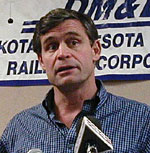By Erin Galbally
Minnesota Public Radio
November 19, 2001
|
| RealAudio |
The most ambitious railroad expansion since the Civil War is one step closer to approval. An environmental impact report on the Dakota Minnesota and Eastern Railroad's $1.4 billion plan, gives a boost to DM&E hopes to haul coal from Wyoming through Minnesota and South Dakota to eastern power plants.
| |
|
|
|
||
Rochester suffered a major setback in its battle with the Dakota, Minnesota and Eastern Railroad. City officials spent four years and more than $600,000 fighting the railroad's expansion plan. They argued that downtown Rochester would suffer if coal trains raced through the city.
The final environmental impact statement is a disappointment for Rochester and three other cities pushing for bypasses.
Rochester Mayor Chuck Canfield says the report failed to adequately address concerns over tourism and the Mayo Clinic's business. "There are a number of things that are very important to this community that just aren't part of the message that we've gotten so far," according to Canfield.
The report does say the railroad will have to pay for overpasses and safety improvements in Rochester. In fact, more money will be spent in Rochester than in any other community along the route. But the city is still without a bypass. That's something city attorney Terry Adkins says will be difficult to overturn in court.
"If there is litigation, you can't ask a court to order a bypass. You can't ask a court to order 10 overpasses. What you do is tell the court they didn't do it right; the final impact statement is full of errors and factual misstatements and you ask the court to send it back to the Surface Transportation Board to do it again. Essentially the most you can get out of litigation is a do over," Adkins said.
DM&E President Kevin Schieffer says the federal report essentially gives a green light to his project. He says communities that are displeased with the ruling have little power to halt construction, which he expects will begin in 2003.
"This is a federally regulated project. Communities are - in these cases - not as communities that issue permits. They are in these cases as parties to the federal process. So when the federal government makes its decision, that's the decision and there is not hold up power per se," Schieffer said.
The DM&E will be required to spend at least $140 million on improvements like overpasses and safety crossings. Those are designed to reduce the impact as trains travel along the route.
Victoria Rutson, who heads the environmental analysis section of the Surface Transportation Board, says the decision to recommend against bypasses for any community was based on environmental factors. "We were really weighing the environmental concerns of both alternatives - the existing route or a bypass route. Would a bypass route solve problems of having coal trains operating through these communities? For example, in Rochester the high probability of sink holes along the route proposed for a bypass was really problematic," Rutson said.
Rochester officials may be upset - but not surprised - by this final environmental report. Officials in Pierre and Brookings say they feel the same. Efforts are underway in those communities to raise local money to pay for a bypass. But any bypass plan would have to be approved by the Surface Transportation Board.
Rep. Bill Kuisle, R-Rochester, opposes a Rochester bypass. He's part of a rural coalition of farmers and landowners. Kuisle says he and his neighbors are a bit surprised since they were the underdogs in this fight. He wonders what happened to Rochester.
"They are at square one, have spent maybe $700,000 and have nothing to show for it," Kuisle said.
A final ruling on the project by the Surface Transportation Board is due out in beginning of next year. Even though Rochester may be in for a hard legal battle, it's likely many communities along the route will take their arguments to court.
More from MPRMore Information

